| « The War Against Free Thought | Is the Middle East heading towards the eighth war? » |
The G-20 Announces a "New World Order"
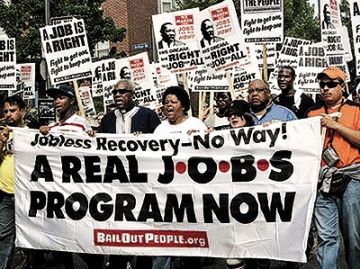
bailoutpeople.org
Citizens Respond
Michael Collins
PITTSBURGH -- A new world order is emerging at the G-20 Summit in Pittsburgh with a decision by the group to become the premier coordinating body on economic issues. Radio Free Europe, Sep. 26, 2009
The world's most exclusive public club, the G-20, met last week in Pittsburgh for "the opportunity to take stock of the progress made and discuss further actions to assure a sound recovery from the global economic and financial crisis." The G-20 consists of finance ministers and senior banking officials from the world's 20 largest economies. Federal Reserve Board Chairman Ben Bernanke and Treasury Secretary Tim Geithner were there for the United States. But the real action comes from the gathering's function as an informal summit for attending heads of state.
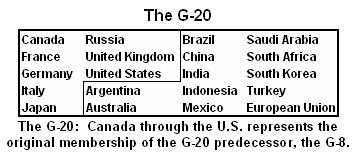
The Pittsburgh Summit focused on changing the regulations governing the world's financial institutions and processes In addition to rewriting the rule book, the "new world order" announced that the G-20 is now the "premier coordinating body on economic issues" which will benefit the wealthiest interests in each member country.
But it was more than just about making the banks behave. In cooperation with U.S. and foreign law enforcement agencies, Pittsburgh police and unidentified law enforcement agents unveiled some new programs for citizens. These had nothing to do with much needed jobs and health care, barely mentioned at the meeting. Rather, the G-20 premiered the "sonic cannon," a device designed to cause serious pain from ultra shrill sonic waves beamed at those exercising their rights of freedom of speech and assembly.
Law enforcement used the more traditional techniques like the citizen "grab and snatch." This maneuver has four rapid stages: unidentified law enforcement officials show up in an unmarked car; grab a random citizen; shove him into a car against his will; and drive off, all without a word of explanation.
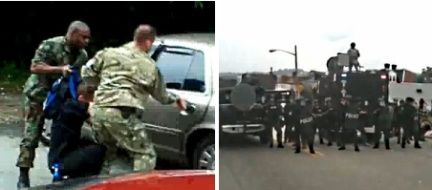
The "snatch and grab" (left, video). The "sonic cannon" (right, video) was deployed and emitted these exact words: "Pittsburgh Chief Police: This is an unlawful assembly. I order all those assembled to immediately disburse. You must leave the immediate vicinity. If you remain in this immediate vicinity, you will be in violation of the Pennsylvania crimes code,
no matter what your purpose is."
There were no criticisms of police actions from the G-20 leaders, many of whom preside over nominally democratic states. That's probably because there were no questions from the press.
The power salon has been functioning since 1975 when a smaller, even more exclusive group met at the request of the then President of France, Valéry Giscard d'Estaing. The G-8 leaders convened to manage the economic and social impact of rapidly rising oil prices. One year later, prices dipped briefly then nearly tripled after the Iranian Revolution.
Over the years, the world's financial leaders met periodically, building the franchise, until the Pittsburgh Summit at which the new magic number of 20 nations was announced, the G-20.
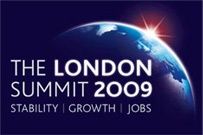
At an April G-20 meeting in London the focus was on "Stability, Growth, Jobs." A look at the four working groups from that meeting shows two focused on international finance and two on international financial organizations, the World Bank and the International Monetary Fund.
The ongoing economic struggle of billions of people didn't deter key G-20 figure Fed Chairman Ben Bernanke from announcing that the worldwide recession is "very likely over." Of course, there's a qualifier. It will be a jobless recovery which raises the question, just exactly who will be recovering?
The Epitome of Failure
An objective judgment on the promises of the London G-20 meeting, growth and jobs, shows a complete failure by the group. The world's economy continues to slide into oblivion with no remaining bright spots except for Wall Street bankers and others who caused the crisis. The largest U.S. and European financial groups have cash and credit guarantees of a potential $23.7 trillion (annotation) to preserve their market positions and executive perks. These guarantees were enabled by the actions of some of the very same leaders attending the Pittsburgh conference. It's a tight circle.
One sixth of the world population suffers from hunger largely due to unemployment, high food prices, and the high cost of borrowing due to the current financial crisis. Unemployment is increasing around the world complicated by a largely unmentioned structural jobs shortage. A report from the International Labor Organization shows that unemployment has grown to 190 million worldwide with an estimated 50 million more to join them in 2009. Rates of "working poverty" are expected to hit 1.3 billion people worldwide.
Even if the job market improves, the struggle to buy basic necessities will continue to pose a challenge for the vast majority of citizens. In the United States, for example, there has been no real increase in per capita income for the past nine years and few net new non government jobs.
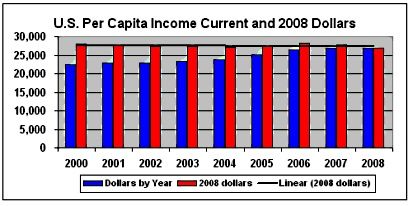
U.S. Income U.S. Census Bureau *
The people who brought the world to this state of decline and struggle are still in charge. They're fixing the very problems they created.
What's their solution?
Change the way banks are regulated.
Sowing the Wind
The U.S. can no longer finance the military presence overseas without major debt. Foreign wars are simply not affordable. The banking system is in critical condition, unable to recover except on a superficial level. The neglect of domestic concerns in the United States and the ongoing drain of wealth from the middle, working and lower class have virtually eliminated taxation and the treasury as a viable source of real funds.
Undeterred, the United States government has begun yet another war it cannot afford in Afghanistan before even beginning to end the occupation of Iraq. At the same time, the government has issued trillions of dollars in cash and credit for a banking sector with many banks technically broke.
The rest of the world continues to struggle despite optimistic talk at the summit. Japan remains in a recession after nearly two decades and has just begun a faltering recovery. In Germany, there are fears of deflation. China may have exhausted credit and protectionist fixes in an attempt to avoid a major slump. Spain's unemployment figure will reach 20% soon.
More to the point of globalization, there are 1.3 billion "working poor" (p. 39) earning $2.00 (two dollars) a day concentrated in South, East, and Southeast Asia and sub-Saharan Africa. Does the G-20 recovery plan include these subsistence workers? When is it their turn to "recover?"
What's the response by the world's leaders? Regulatory reform of banking and finance will save us. If we only have better banking rules, they argue, we will somehow be able to generate enough dollars to keep the key enterprises going - financial and military dominance - while something may come along to help with concerns like jobs, health, and increased income.
Here's what they're really saying: it's time to fix a new set of rules that allow the game to continue in some form that will protect accumulated wealth and maintain those in power.
While the leaders and their finance ministers workout the latest scheme to produce a balance sheet that won't generate laughter and derision, they must ponder the finite limitations of their economies. Unlike the exuberance of the 1950's with the assumption of limitless energy in the form of oil, there's an awareness that the fuel underlying the entire scheme is increasingly more difficult and expensive to extract. Concerns about diminishing returns from exploration and extraction are mixed with notions that there may be an end to the affordability of oil given the voracious appetite of two of the new G-20 members, China and India.
But the leaders can sit in repose at their elegantly catered conference dinners with the comfort that although they may not be the managers of a perpetual scheme of "growth" for their incredibly wealthy patrons, they will certainly transition to the role managing the chaos caused by their efforts. Their street level operatives unveil new technologies and techniques at each G-20 conference to discourage those who seek to disagree by public assembly and free speech. When the G-20 is in town, basic political rights here and overseas are suspended. It's time for the beat down.
The heavy handed, technically brutish suppression of public protest are a form of instructive theater that engenders a feeling of helplessness for many who might otherwise be motivated to resist. This in turn perpetuates order and protection for the G-20's ongoing acts of greed and incompetence inflicted upon the vast majority of citizens in the nations they represent. If they quiet the voice of the people long enough, the leaders may even begin to think that the voices never existed in the first place. They can ignore what they've forgotten, the will of those they govern.
END
This article may be reproduced in whole or in part with attribution of authorship and a link to this article.



